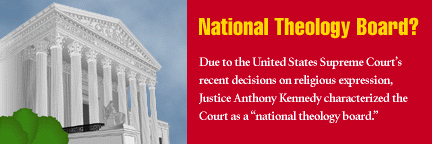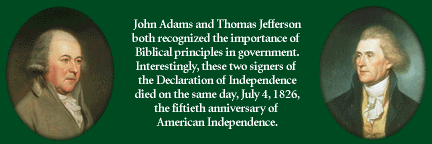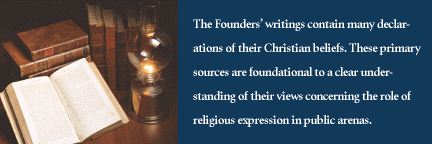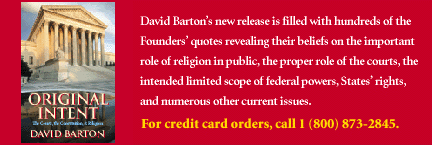NEWS
QUOTES:
"The moral principles and precepts contained in the Scriptures ought to form the basis of all our civil constitutions and laws. All the miseries and evils which men suffer from vice, crime, ambition, injustice, oppression, slavery, and war, proceed from their despising or neglecting the precepts contained in the Bible."--Noah Webster
ARTICLES
- Religion (OFFSITE LINK) -Online Library of Liberty
- God and our State's Constitutions
 Founding Fathers Quotes:
Was the United States Founded as a Christian Nation?
Founding Fathers Quotes:
Was the United States Founded as a Christian Nation? Was America Founded as a Christian Nation?-Antishyster News
Magazine
Was America Founded as a Christian Nation?-Antishyster News
Magazine- Washington's Thanksgiving Proclamation (OFFSITE LINK) -Washington Papers
- Founding Fathers Quotes on Religion
- Faith of our Founding Fathers-Powerpoint presentation.
- President Bush's Prayer Meeting-Sept 20, 2001
- George Washington's Vision and Prophesy for America
- It Does Not Matter What One Believes
- Forgotten History
MEDIA
- Monument Men: The Road to Rushmore (OFFSITE LINK) -Amazon Prime
- Foundations of Freedom Course (OFFSITE LINK) -David Barton of Wallbuilders. Amazon Prime Video
 Main link
Main link Video 1: The Founders' Bible
Video 1: The Founders' Bible Video 2: The Foundations of Law-Part 1
Video 2: The Foundations of Law-Part 1 Video 3: The Foundations of Law-Part 2
Video 3: The Foundations of Law-Part 2 Video 4: What Makes America Different?
Video 4: What Makes America Different? Video 5: The Bible and Civil Justice
Video 5: The Bible and Civil Justice Video 6: The Bible and Economics
Video 6: The Bible and Economics Video 7: The Bible and Science
Video 7: The Bible and Science Video 8: The Bible, Competition, and Choice
Video 8: The Bible, Competition, and Choice Video 9: The Bible and the Judiciary
Video 9: The Bible and the Judiciary Video 10: God and Government
Video 10: God and Government Video 11: Courageous Church
Video 11: Courageous Church Video 12: Real Religion
Video 12: Real Religion Video 13: Manners and Civility
Video 13: Manners and Civility Video 14: Political Integrity
Video 14: Political Integrity Video 15: Raising Expectations
Video 15: Raising Expectations Video 16: One Nation Under God
Video 16: One Nation Under God Video 17: Great AMerican Myths
Video 17: Great AMerican Myths Video 18: A Republic that Stands
Video 18: A Republic that Stands
- Prager U (OFFSITE LINK)
- David Barton-Wallbuilders.com
- U.S. Capitol Tour with David Barton (OFFSITE LINKS)
- America's Godly Heritage-video by David Barton
- The American Heritage Series (OFFSITE LINK) -By David Barton, on Amazon Prime
- Foundations of Freedom (OFFSITE LINK) -By David Barton, on Amazon Prime
- Drive Thru History: Discovering America's Founders (OFFSITE LINK) -By David Barton, on Amazon Prime
- Youtube
 What You're Not Supposed to Know About Americas Founding (OFFSITE LINK) - Arthur R. Thompson, John Birch Society
What You're Not Supposed to Know About Americas Founding (OFFSITE LINK) - Arthur R. Thompson, John Birch Society Christian Heritage in Plymouth MA (OFFSITE LINK) - Pastor Garrett Lear
Christian Heritage in Plymouth MA (OFFSITE LINK) - Pastor Garrett Lear Was the United States Ever a Christian Nation? (OFFSITE LINK) - Bryan Chapell, The Gospel Coalition
Was the United States Ever a Christian Nation? (OFFSITE LINK) - Bryan Chapell, The Gospel Coalition Hidden Faith of the Founding Fathers (OFFSITE LINK) - The Truth Library
Hidden Faith of the Founding Fathers (OFFSITE LINK) - The Truth Library
SERMONS
- Christopher Ferrara (OFFSITE LINK)
- Pastor John Weaver (OFFSITE LINK)- sermons from John Weaver Library
- Where We Are and How We Got Here
- The World and Times of Jesse James
 Conversion of General Richard Ewell (2000/07/09)
Conversion of General Richard Ewell (2000/07/09) The Death of Sam Davis (2000/11/14)
The Death of Sam Davis (2000/11/14) The Confederate Chaplains (2003/03/16)
The Confederate Chaplains (2003/03/16) The Truth About the Confederal Battle Flag (2005/01/22)
The Truth About the Confederal Battle Flag (2005/01/22) Is America a Lost Nation (2005/07/31)
Is America a Lost Nation (2005/07/31) John McCorkle (2005/09/25)
John McCorkle (2005/09/25) The Revival in the Confederate Armies (2005/10/30)
The Revival in the Confederate Armies (2005/10/30) Why the South Must Rise Again (2006/01/15)
Why the South Must Rise Again (2006/01/15) The Pledge-History and Problems 1 (2006/04/09)
The Pledge-History and Problems 1 (2006/04/09) The Pledge-History and Problems 2 (2006/04/16)
The Pledge-History and Problems 2 (2006/04/16) Stephen Dill Lee (2006/06/15)
Stephen Dill Lee (2006/06/15) William Thomas Overby (2006/09/03)
William Thomas Overby (2006/09/03) Confederate Sacrifices (2006/12/17)
Confederate Sacrifices (2006/12/17) God's Answer to Americas Problems (2007/03/16)
God's Answer to Americas Problems (2007/03/16) Jack Jouette- Patriot, Hero (2007/07/01)
Jack Jouette- Patriot, Hero (2007/07/01) The Story of Joratio G. Spafford (2008/03/23)
The Story of Joratio G. Spafford (2008/03/23) Manson Jolley the South Carolina Avenger (2008/06/26)
Manson Jolley the South Carolina Avenger (2008/06/26) Jefferson Davis Revisited (2008/06/29)
Jefferson Davis Revisited (2008/06/29) Bushwacker Johnston (2008/08/10)
Bushwacker Johnston (2008/08/10) Principles From Heart of Dixie (2009/04/26)
Principles From Heart of Dixie (2009/04/26) Jack Hinson, Confederate Sniper (2009/08/16)
Jack Hinson, Confederate Sniper (2009/08/16) A Wild Confederate Rose (2010/04/25)
A Wild Confederate Rose (2010/04/25) Richard Cameron -The Lion of the Covenant (2011/06/05)
Richard Cameron -The Lion of the Covenant (2011/06/05) General Nathan Bedford Forrest (2011/06/26)
General Nathan Bedford Forrest (2011/06/26) In Honor of Confederate Veterans and Prisoners (2012/07/01)
In Honor of Confederate Veterans and Prisoners (2012/07/01) Stonewall Jackson & the Christian Grace of Self Control (2013/02/02)
Stonewall Jackson & the Christian Grace of Self Control (2013/02/02) Captain Jonthan Davis-A Combat Mentality (2013/04/14)
Captain Jonthan Davis-A Combat Mentality (2013/04/14) The Puritan Hope: A Reformed Expectation For Success (2015/08/20)
The Puritan Hope: A Reformed Expectation For Success (2015/08/20)
- Pastor Sheldon Emry (OFFSITE LINK)-sermons from Sheldon Emry Memorial Library.
- George Washington-Product of Christian Preaching
- The Bible and the Great Seal of the United States
- America's Christian Roots
 America is God's Country, Sermon 8212a
America is God's Country, Sermon 8212a Zion in America, Sermon 8315b
Zion in America, Sermon 8315b Thank God for America and Canada, Sermon 7019a
Thank God for America and Canada, Sermon 7019a
RESEARCH
- Religion (OFFSITE LINK) -Online Library of Liberty
- Books on History (OFFSITE LINK) -Online Library of Liberty
- Pastor Sheldon Emry (OFFSITE LINK)-Sheldon Emry Memorial Library
 Heirs of the Promise
Heirs of the Promise America in the Kingdom Parables -C.O. Stadsklev
America in the Kingdom Parables -C.O. Stadsklev Zion of Bible Prophecy -C.O. Stadsklev
Zion of Bible Prophecy -C.O. Stadsklev The United States-in the Prophesy of Joel & Zephuniah -C.O. Stadsklev
The United States-in the Prophesy of Joel & Zephuniah -C.O. Stadsklev The Cleansing Of Our Nation -C.O. Stadsklev
The Cleansing Of Our Nation -C.O. Stadsklev
- Wallbuilder's American Foundations Digital Library (OFFSITE LINK)-the most complete documentatation on America's Godly Heritage available. By Logos Research.
- A Few Declarations of Founding Fathers and Early Statesmen on Jesus, Christianity, and the Bible (OFFSITE LINK) -Wallbuilders.com
- By This Standard (OFFSITE LINK)-free electronic book about the authority of God's Law (the Bible) in our contemporary American Society. Very interesting
- Founder's Almanac-Heritage Foundation
- Heritage Foundation (OFFSITE LINK)
- Religion and the Founding of the American Republic (OFFSITE LINK)-Library of Congress
- Under the Influence: How Christianity Transformed Civilization (OFFSITE LINK)-Dr. Alvin Schmidt
- Teaching American History Documents Online Library (OFFSITE LINK)-Ashbrook Center
RELIGIOUS FOUNDERS? READ THEIR WRITINGS!
(Footnotes are in brackets [ ].)
Among the liberties protected by our Constitution is the First Amendment's "free exercise of religion." Yet, over the past half-century, that once inalienable liberty has been greatly subjugated to the arbitrary whims of the Justices by a series of hostile and absurd Court decisions. In fact, the current Court's micromanagement of religious expressions prompted Justice Anthony Kennedy to characterize it as a "national theology board." [1]

Recent attempts to limit public religious expression and to vilify people of faith have met widespread public opposition. The results of this backlash have manifested in numerous areas, including: (1) the landslide elections of evangelical Congressmen in 1994; (2) public support for a constitutional amendment to protect religious liberties reaching an all-time high of seventy-three percent; [2] and (3) the recent Congressional introduction of a widely-supported constitutional amendment which would safeguard religious expressions.
However, there are groups and individuals whose goal of a secular society is clearly threatened by these changes. But what can they do to diminish the improving public climate toward religion? They can do what they have always done: misportray, distort, and/or ignore the truth. Those who become particularly skillful at this are termed "revisionists."
The Ploys of Revisionists
When revisionists attempt to concoct support for their usually unpopular viewpoint, they often vilify figures past or present who embrace the position they reject. This tactic was evident in 1995's onslaught of media articles claiming that America's success was due to its long-standing tradition of secularism.
For example, Steven Morris's Los Angeles Times article, "America's Unchristian Beginnings" 3 (picked up by wire services and reprinted in scores of newspapers across the nation), was loaded with deliberate falsehoods to "prove" America's Founders were purely secular. For instance, concerning John Adams, Morris claimed:
Late in life, he wrote, "Twenty times in the course of my late reading have I been upon the point of breaking out, 'This would be the best of all possible worlds if there were no religion in it!!!' "
The Rest of the Story
This statement appears in Adams's letter to Thomas Jefferson on April 19, 1817, in which Adams recounted a conversation between Joseph Cleverly and Lemuel Bryant 計; a schoolmaster and a minister he had known. Disgusted by the petty religious bickering displayed by those two, Adams declared to Jefferson:
Twenty times in the course of my late reading have I been on the point of breaking out, "This would be the best of all possible worlds, if there were no religion in it!!!" But in this exclamation I would have been as fanatical as Bryant or Cleverly. Without religion this world would be something not ft to be mentioned in polite company, I mean hell. [4]

In reality, revisionists like Steven Morris (and especially those from the Society of Separationists or the American Atheist Society) deliberately reverse Adams's position. Not only did Adams declare that it would be "fanatical" to desire a world without religion (and that such a world would be "hell"), but on May 5, 1817, Jefferson wrote back to Adams and said that he agreed!
What makes revisionism so effective is that few citizens actually take time to confrm revisionists' claims or to proclaim to the public the real facts.
Speaking for Themselves
Since the goal of Morris and others like him is to "prove" that people of faith have no precedent for being involved in politics, he characterizes the Founders' general religious beliefs with the same false summary that most revisionists 計; both in academia and media 計; often proclaim:
The early presidents and patriots were generally deists or Unitarians, believing in some form of impersonal Providence but rejecting the divinity of Jesus and the relevance of the Bible.
Yet, the Founders' own declarations in their last wills and testaments 5 disprove those assertions and speak loud and clear that the great majority of our Founders were indeed believers in Jesus Christ. For example:
- First of all, I . . . rely upon the merits of Jesus Christ for a pardon of all my sins. Samuel Adams, Signer of the Declaration
- To my Creator I resign myself, humbly confding in His goodness and in His mercy through Jesus Christ for the events of eternity. John Dickinson, Signer of the Constitution
- I resign my soul into the hands of the Almighty who gave it in humble hopes of his mercy through our Savior Jesus Christ. Gabriel Duvall, U.S. Supreme Court Justice; selected as delegate to Constitutional Convention
- This is all the inheritance I can give to my dear family. The religion of Christ can give them one which will make them rich indeed. Patrick Henry
- I render sincere and humble thanks for His manifold and unmerited blessings, and especially for our redemption and salvation by his beloved Son. . . . Blessed be his holy name. John Jay, Original Chief-Justice U.S. Supreme Court
- I am constrained to express my adoration of . . . the Author of my existence . . . [for] His forgiving mercy revealed to the world through Jesus Christ, through whom I hope for never ending happiness in a future state. Robert Treat Paine, Signer of the Declaration
- I think it proper here not only to subscribe to . . . doctrines of the Christian religion . . . but also, in the bowels of a father's affection, to exhort and charge them [my children] that the fear of God is the beginning of wisdom, that the way of life held up in the Christian system is calculated for the most complete happiness. Richard Stockton, Signer of the Declaration

These wills represent only a few examples from many with the identical tone. Furthermore, the personal writings of numerous other Founders contain equally strong declarations. Notice:
- My hopes of a future life are all founded upon the Gospel of Christ and I cannot cavil or quibble away [evade or object to]. . . . the whole tenor of His conduct by which He sometimes positively asserted and at others countenances [permits] His disciples in asserting that He was God. [6] John Quincy Adams
- Now to the triune God, The Father, the Son, and the Holy Ghost, be ascribed all honor and dominion, forevermore 計; Amen.[7] Gunning Bedford, Signer of the Constitution.
- You have been instructed from your childhood in the knowledge of your lost state by nature 計; the absolute necessity of a change of heart, and an entire renovation of soul to the image of Jesus Christ 計; of salvation thro' His meritorious righteousness only 計; and the indispensable necessity of personal holiness without which no man shall see the Lord. [8] Elias Boudinot, Revolutionary Officer and President of the Continental Congress (to his daughter)
- You do well to learn . . . above all the religion of Jesus Christ. [9] George Washington
- [D]on't forget to be a Christian. I have said much to you on this head and I hope an indelible impression is made. [10] Jacob Broom, Signer of the Constitution (to his son)
- On the mercy of my Redeemer I rely for salvation and on His merits; not on the works I have done in obedience to His precepts. [11] Charles Carroll, Signer of the Declaration
- I am a real Christian, that is to say, a disciple of the doctrines of Jesus Christ. [12] Thomas Jefferson
- I think the Christian religion is a Divine institution; and I pray to God that I may never forget the precepts of His religion or suffer the appearance of an inconsistency in my principles and practice. [13] James Iredell, U.S. Supreme Court Justice under President George Washington
- My only hope of salvation is in the infnite, transcendent love of God manifested to the world by the death of His Son upon the Cross. Nothing but His blood will wash away my sins. I rely exclusively upon it. Come, Lord Jesus! Come quickly! 14 Benjamin Rush, Signer of the Declaration
- I believe that there is one only living and true God, existing in three persons, the Father, the Son, and the Holy Ghost, the same in substance, equal in power and glory. That the Scriptures of the old and new testaments are a revelation from God and a complete rule to direct us how we may glorify and enjoy Him. [15] Roger Sherman, Signer of both the Declaration and the Constitution
- I shall now entreat . . . you in the most earnest manner to believe in Jesus Christ, for "there is no salvation in any other" [Acts 4:12]. . . . [I]f you are not clothed with the spotless robe of His righteousness, you must forever perish. [16] John Witherspoon, Signer of the Declaration
There are many other examples.
Summary
The evidence is clear; the revisionists are wrong. Although there was some anti-organized-religion sentiment among the Founders (e.g., Thomas Paine, Ethan Allen, Charles Lee, Henry Dearborn), those with such views were a small minority and, in fact, often were strongly criticized by others for those beliefs.
It is time that Christians retake the academic high ground. When historically false editorials or letters-to-the-editor are written, or when call-in programs make reckless charges, we need to stand up and confront those errors. This will provide an opportunity for those who are undecided on the issue of public religious expressions to formulate their opinions from accurate information rather than from revisionist trash. The most effective defense against revisionism is aggressive truth 計; and lots of it! If we will faithfully present the truth, the Scriptures assure us that it will eventually prevail.
Good News!
If the quotes you have seen in this newsletter are inspiring or new to you, or if you are looking for more information like this, then you will be excited to learn of our newest book: Original Intent. This 500+ page book provides literally hundreds of the Founders' quotes (and over thirteen hundred footnotes) documenting the Founders' beliefs on the important role of religion in public, on the proper role of the Courts, on the intended limited scope of federal powers, on States' rights, and on numerous other current issues. This book 計; a veritable encyclopedia of quotes and information 計; is an excellent tool for self-education and also for general public education in arenas where credibility, accuracy, and source documentation is a must. To order Original Intent, call (800) 873-2845.

Endnotes
1. County of Allegheny v. ACLU; 106 L. Ed. 2d 472 at 543, Kennedy, J. (concurring in part and dissenting in part).
2. CNN/USA Today/Gallup Poll, November 28-29, 1994.
3. Steven Morris, "America's Unchristian Beginnings," Los Angeles Times, August 3, 1995, p. B-9.
4. John Adams, Works of John Adams, Charles Francis Adams, editor (Boston: Little, Brown, and Co., 1856), Vol. X, p. 254.
5. Copies of these wills are in our files and may be obtained from State archives and from historical societies.
6. The Select Writings of John and John Quincy Adams, Adrian Koch and William Peden, editors (New York: Alfred A. Knopf, 1946), p. 292, to John Adams on January 3, 1817.
7. Gunning Bedford, Funeral Oration Upon the Death of General Washington (Wilmington: James Wilson, 1800), p. 18.
8. Elias Boudinot, The Life, Public Services, Addresses, and Letters of Elias Boudinot, President of Continental Congress (Boston and New York: Houghton, Mifflin, and Co., 1896), Vol. I, pp. 260-262.
9. George Washington, The Writings of George Washington, John C. Fitzpatrick, editor (Washington, D.C.: U.S. Government Printing Offce, 1932), Vol. XV, p. 55, to the Delaware Indian Chiefs on May 12, 1779.
10. From an autographed letter in our possession written by Jacob Broom to his son, James, on February 24, 1794, from Wilmington, Delaware.
11. From an autographed letter in our possession written by Charles Carroll to Charles W. Wharton, Esq., on September 27, 1825, from Doughoragen, Maryland.
12. Thomas Jefferson, The Writings of Thomas Jefferson, Albert Ellery Bergh, editor (Washington, D.C.: The Thomas Jefferson Memorial Association, 1904), Vol. XIV, p. 385, to Charles Thomson on January 9, 1816.
13. James Iredell, The Papers of James Iredell, Don Higginbotham, editor (Raleigh: North Carolina Historical Commission, 1976), Vol. I, p. 11.
14. Benjamin Rush, The Autobiography of Benjamin Rush, George W. Corner, editor (Princeton: Princeton University Press, 1948), p. 166.
15. Lewis Henry Boutell, The Life of Roger Sherman (Chicago: A. C. McClurg and Co., 1896), pp. 272-273. 16. John Witherspoon, The Works of the Rev. John Witherspoon (Edinburgh: J. Ogle, 1815), Vol. V, pp. 276, 278, from "The Absolute Necessity of Salvation Through Christ," on January 2, 1758.